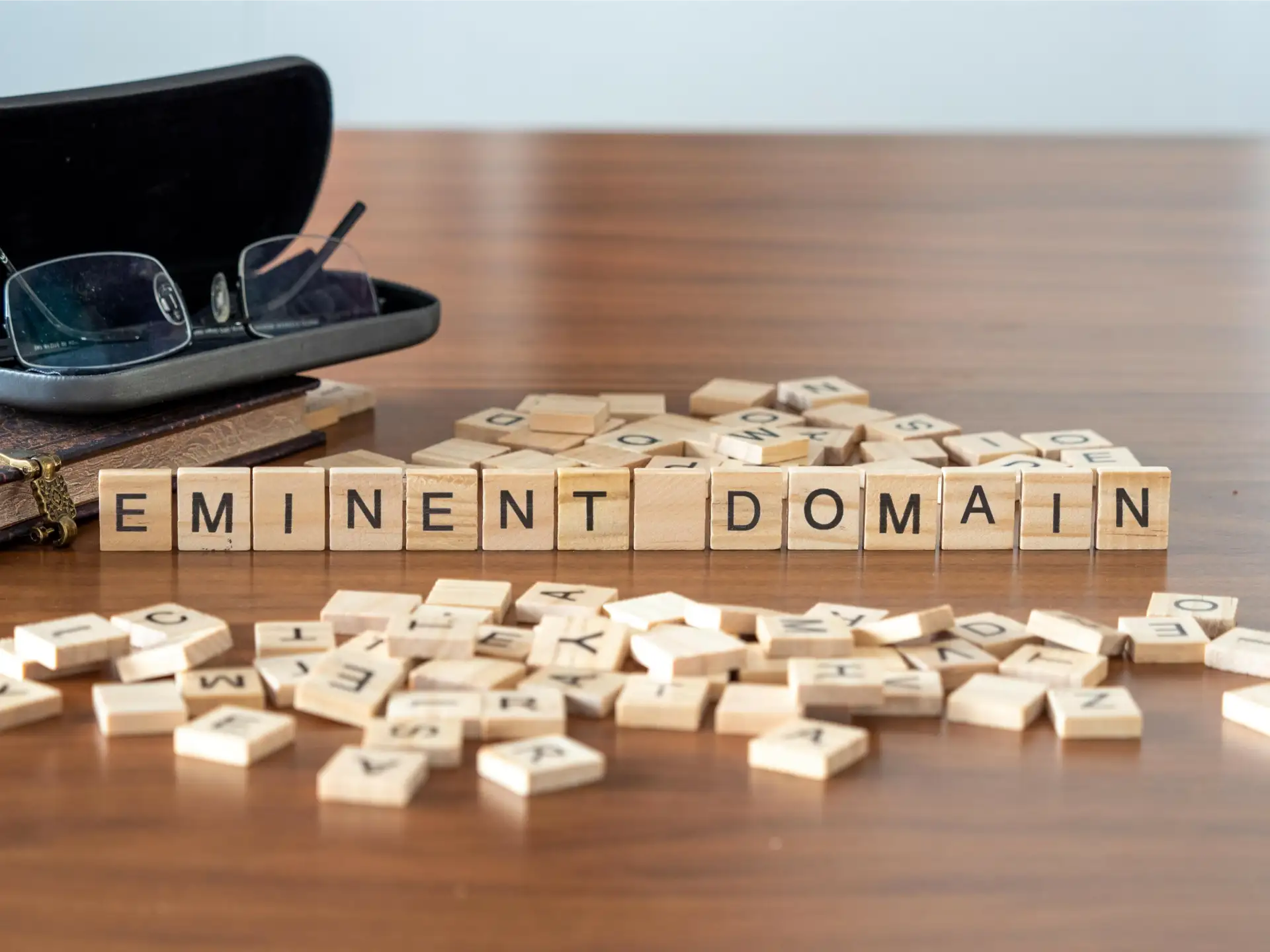It’s no secret that urban centers and rural communities across the country are seeing a number of construction projects take shape. In the wake of the passing of several pieces of new legislation aimed at reducing inflation and investing in infrastructure, construction projects have been announced and funded in cities and rural areas in multiple states. While the construction boom signals a robust economy and an investment in our country’s future, it’s important to recognize how such projects can impact private landowners. For example, a federal, state, or local Department of Transportation may announce plans to build a new highway to improve traffic flow and ease congestion in a particular area. However, in order to accomplish this goal, the Department of Transportation may need to invoke its eminent domain power to seize privately owned property and convert it into the highway onramp.
Essentially, eminent domain authority enables qualifying entities to take private property for projects that benefit the public in some way. The authority that invokes eminent domain power must provide the landowner with “just” or “adequate” compensation in exchange for seizing their land. If you are facing an eminent domain action in Alabama or Texas, you should contact a dedicated and experienced eminent domain lawyer as soon as possible to understand your rights and discuss your options. This post will explore how property owners can navigate eminent domain and condemnation matters, particularly in the wake of recent and anticipated trends in Alabama and Texas.
Eminent Domain and Condemnation Basics
Before we dive into the emerging eminent domain trends, it’s important to define these terms. The Fifth Amendment to the U.S. Constitution endows governmental entities with eminent domain power. Eminent domain is defined as “the power of the government to take private property and convert it into public use, referred to as the taking.” Moreover, “the government may only exercise this power if they provide just compensation to the property owners.” In other words, an entity wishing to invoke its eminent domain power may only do so if the proposed project benefits the public and if it provides sufficient compensation to the property owner for taking their land. Eminent domain refers to this constitutional power to seize private property for public use, while the term “condemnation” refers to the formal legal process by which land is acquired. For instance, a governmental entity may decide to invoke its eminent domain power by initiating condemnation proceedings against a property owner whose land is required to construct a new public park, road, waterway, or other public service. As a landowner, you can expect to receive notice from the governmental entity if your property will be impacted.
Recognizing Emerging Trends in Eminent Domain
Eminent domain power has existed since the inception of the United States. For the most part, this Constitutional power has been used for freeway construction, railway expansion, transportation of utilities like water and natural gas, and other purposes that benefit the public. However, as undeveloped land becomes more scarce, it’s important to recognize how eminent domain and condemnation matters are shifting in response.
Recent Eminent Domain Considerations in Texas
Texas residents enjoy some of the most robust legal protections in the country. In recent years, Texas legislators and State Courts have worked hard to protect the rights and interests of private property owners. Comprehensive resources for private property owners urge those facing condemnation to understand and exercise their legal rights. Moreover, the entity wishing to invoke eminent domain power must provide landowners with the State of Texas Landowner’s Bill of Rights, which empowers private property owners to demand fair and adequate compensation in exchange for giving up their land. As proposals for urban development continue to grow, it’s essential to monitor the response of the Texas courts and legislature in determining whether such actions are acceptable interpretations of the “public use” requirement.
Understanding Alabama Eminent Domain Law Trends
Alabama has been at the forefront of protecting landowners from eminent domain misuse. When the U.S. Supreme Court issued a ruling in 2005 that expanded the definition of public use to cover projects intended for private economic interest, Alabama responded by passing Senate Bill 68. This legislation clarified that eminent domain could no longer be used for “private retail, office, commercial, industrial, or residential development; or primarily for enhancement of tax revenue; or for transfer to a person, nongovernmental entity, public-private partnership, corporation, or other business entity.” One year later, Alabama passed House Bill 654 that “narrowed the criteria by which property could be designated as blighted,” which reduced the number of eminent domain and condemnation actions affecting so-called blighted neighborhoods.
Steps to Take When You Receive a Condemnation Letter
When you receive a condemnation notice, it’s natural to feel anxious and confused about what this letter means. These documents are often worded in a way that appears to leave little room for negotiation. What’s more, the condemning authority usually makes a lowball compensation offer in the hope that you will simply accept their valuation of your property and move on. However, it’s essential to recognize that you have many rights, which are often unknown to or underutilized by property owners facing condemnation. Enlisting the guidance of a trusted and experienced condemnation attorney is the best way to negotiate a truly equitable amount of compensation in exchange for your property. Learn more about what to expect during the condemnation process by contacting an eminent domain attorney or condemnation lawyer today.
As a property owner, facing condemnation can be an overwhelming and intimidating experience. However, you do not have to go through this process alone. With over 100 years of combined experience representing property owners throughout Alabama and Texas, the dedicated legal team at Sewell Sewell Beard LLC is ready to assist you. Call our Jasper, Alabama office at (205) 544-2350 or our Prosper, Texas office at (972) 777-5390 today to get started with a knowledgeable and highly qualified condemnation attorney.

